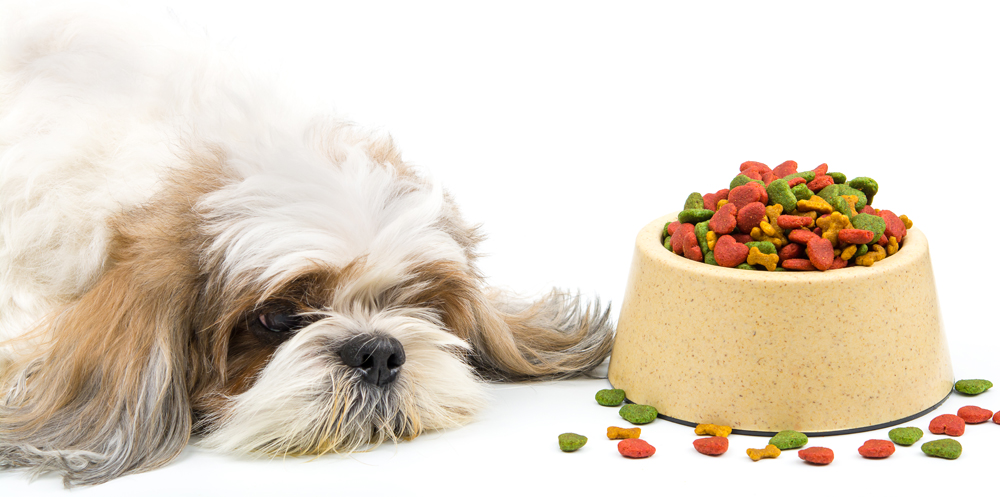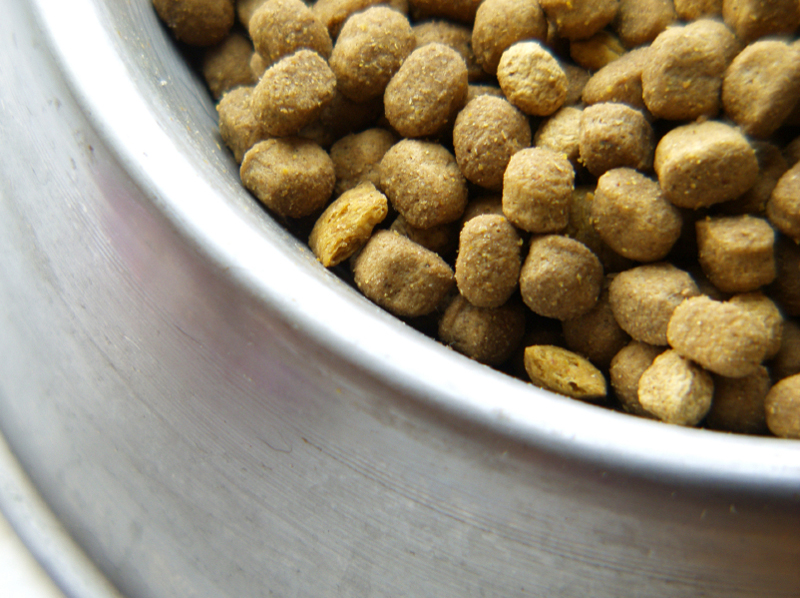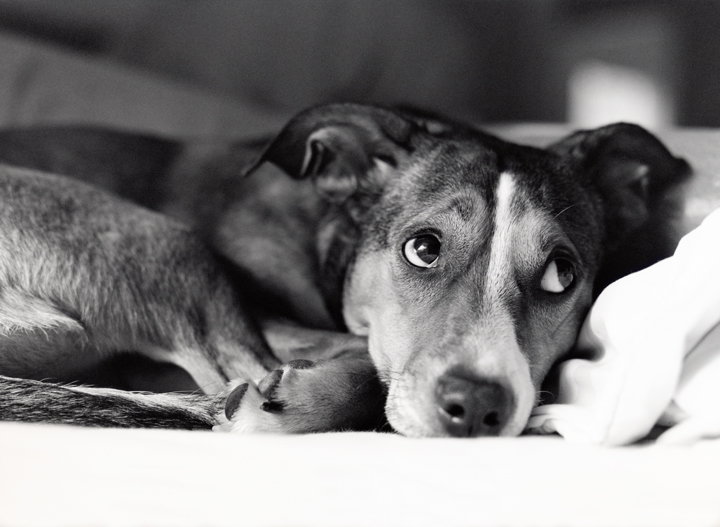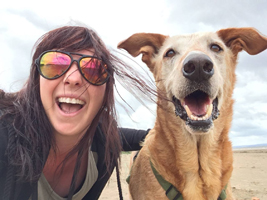Why is my dog a fussy eater?
February 14, 2018 | By Roz Pooley, The Mutty Professor

This article is going to be a bit of a long one but for a complex subject that is often under considered, it's hard to keep this sort of thing brief. There's a lot of info to consider.
But before we go on, remember that we are talking about true fussiness here - that is dogs who do not show any enthusiasm to a specific food when the bowl is put down. This does not apply to dogs who gorge themselves to the point where they can no longer eat, to dogs who have learned that something better is always coming along or, of course, to dogs whose apetite is suppressed due to medication or a diagnosed health problem (such as pancreatitis or an enzyme deficiency/EPI).
As a pet carer and trainer I see too many animals who are on diets that do not suit them - and their carers may not even be aware of it.
Diet is EVERYTHING! It plays a huge role in the behaviour and health of all living beings because every function and process in our body depends on nutrition to fuel it.
When assessing behaviour cases I take an extensive history on each dog, asking enough in depth questions to fill a 12 page form. Two of those questions are:
" What is your dog's attitude towards food?"
and
"Does your dog eat all of their food in one sitting?"
Would you believe that every case that I personally see that says 'no' to the second question is fed a diet high in grain/cereals and/or animal derivatives? They are always being fed a dry food diet (kibble) and more often than not the brands they are being fed are Royal Canin or Iams. Other common 'offenders' are Arden grange, Eukanuba, Science Diet and James Wellbeloved. Frequently carers of these dogs write 'they pick out the meat and leave the biscuits'.
On the pet care side of the business we care for a lot of cats and if I had £1 for every stale bowl of unwanted IAMS I threw in the bin I'd be a very rich lady.
Too often pets who don't eat their food in one go are labelled as 'fussy' or 'picky'. This is my personal take on fussy eaters, who in my humble opinion, are more often than not anything BUT fussy!
If they aren't fussy, why aren't they eating their food?
While some cases of fussiness may be purely behavioural (though not may in my experience), I believe the vast majority of 'fussy' eaters are actually intolerant to something in their food.
Dry food fed animals are traditionally fed the same thing day in and day out. When fed every day over time an ingredient that can cause a mild aggravation to the digestive system, it can eventually start to cause a lot of discomfort. Anyone whose had Irritable Bowl Syndrome (me!) can vouch for how uncomfortable gut issues can be.
A personal comparison: gluten and I aren't great friends. I can tolerate a sandwich every few days, but have to go careful with how often I eat bread/baked goods because if I eat them too much I wont feel great (I'll spare you the details!)
So, just like me and my love/hate relationship with bread - a dog/cat eventually starts to associate eating with a feeling of discomfort and refuses their food in the hope something more suitable might come along.
As a practitioner of Applied Zoopharmacognosy I have also witnessed dog's amazing ability to select (and turn down) non-food plant based remedies to regulate their health, and I also see this with my own dog's feeding habits.
Kanita will turn her nose up at Raw when her stools are too hard, which I interpret as saying 'no' to the bone content. But she'll happily eat Denzel's Kangaroo meat (wet dog food by Akela). I've also seen her turn her nose up at Salmon (raw food) after a few meals, which I interpreted as being down to the level of Omega 3s and 6s in the food and her knowing she's reached her optimum.
On the rare occasion she's been a bit 'off' she's turned her nose up at raw altogether and only eats wet (Akela food). I interpret as her instinctively knowing her system isn't strong enough to handle the low levels of bacteria that go hand in hand with raw feeding. My recently deceased dog Leto stopped eating raw when he became more ill too and was moved onto quality wet food. Again I interpreted it as him understanding he wasn't strong enough to handle any bacteria, or perhaps the cold temperature wasn't right for him.
Rather than make them go without, when my dogs don't eat their meal I consider why this might be and go and find something that they will eat.
If they aren't being fussy, why do they pick (graze) at their food?
Quite simply - because nothing else becomes available and survival needs (needing to eat something to live) prioritises over personal preference.
Back to me and bread. I can choose to not eat bread, but if I'm having a mega busy day of back to back consults and the only shop I pop into for lunch has nothing but a white bread (vegetarian) sandwich - I'll begrudgingly eat a hideous white bread sandwich knowing full well of how it will affect me.
When I'm not so busy with work I am able to choose certain locations for my meal to bypass symptoms of food intolerance. But our pets don't get that choice. Dictating their diets and labelling them as fussy eaters or grazers means many pets are unintentionally forced into eating food that makes them feel like crap.
What about the dogs who have been 'diagnosed' with intolerances who eat their food anyway?
This could be down to the symptom type. An IBS type symptom that presents itself soon after eating can easily be associated with what came just before (eating). Whereas, itchy skin as a symptom is not so easily linked to the cause.
It could also be due to the level of symptoms, mild stomach ache in contrast to huge muscle spasms.
Then there's other individual motivating factors such as a dog who can't cope with hunger as much as another. A dog who leads a more active lifestyle than another may have a bigger appetite. Or it could be that having other dogs in the home competing for resources (food) puts the pressure on to eat what ever is available as quickly as possible.
Lastly the need for other ingredients in the food (such as fats or proteins) can over ride the need to avoid certain ingredients (such as too much starchy carbohydrate).
Why Iams, Royal Canin etc and not other foods?
 I have yet to see a behaviour case that's a 'fussy eater' on raw food. I'm not saying some dogs on raw don't turn their noses up at their meals, but I have noticed a trend with it being linked to certain foods. This could be due to the popularity of the foods in question, but I strongly feel the correlating factor is the ingredients. I have yet to see a behaviour case that's a 'fussy eater' on raw food. I'm not saying some dogs on raw don't turn their noses up at their meals, but I have noticed a trend with it being linked to certain foods. This could be due to the popularity of the foods in question, but I strongly feel the correlating factor is the ingredients.
The dogs I have worked with have all gained a renewed enthusiasm for food once the brand is changed to something better quality.
Let's look at the common offending brands and the main ingredients they use:
IAMS: A mere 20% Chicken (fresh meat so the percentage left in the finished product after the water has been removed will be much less!), MAIZE, WHEAT
ARDEN GRANGE: Chicken meat MEAL 27%, RICE, MAIZE,
EUKANUBA: Chicken & turkey MEAL 37%, MAIZE
ROYAL CANIN: Poultry MEAL, MAIZE, MAIZE FLOUR, WHEAT FLOUR
HILLS/SCIENCE DIET: GROUND RICE, GROUND MAIZE, Chicken & Turkey MEAL, MAIZE GLUTEN
JAMES WELLBELOVED: Lamb MEAL, BROWN RICE, WHITE RICE, BARLEY
So, all of the top ingredients are listed. Laughably some of these foods are considered to be premium brands... and to anyone who buys them, I hate to break it to you - but you are being well and truly ripped off. And below is why:
MAIZE - otherwise known as corn. If your food is produced in the US or US owned then just be aware it's very likely going to be a GMO crop (unless stated otherwise, and even then you cannot rule out cross contamination).
As a starchy carbohydrate, it's used as a source of quick-release energy.
However, a mere 10% of the plant (the maize germ) is actually nutritious and contains non-carb nutrients.
It is dirt cheap to use, and that is why it features so heavily in pet foods. Quite simply, it's bulk, a filler. It's not nutritious.
Maize is hard to digest for dogs and is considered to be one of the main ingredients they are intolerant to. I would never consider feeling any of my pets anything with maize (and for those who feed TAILS....the fantastically 'bespoke' food, I hate to break it to you - but it's full of maize too).
WHEAT - full of the gluten protein. Gluten damages the lining in the small intestine, more aggressively for intolerant individuals. This damage prevents the intestine digesting all the good stuff found in food.
Wheat is cheap, it is a filling ingredient used to bulk up food providing more to eat for less nutrition.
RICE - White rice is a polished version of brown rice. The polishing process removes all of the nutritious parts of the plant, heaven knows why someone thought it would be a good idea to do it for people, let alone for dogs.
Rice is cheap and as a starchy carbohydrate it provides quick-release energy. And you guessed it, it's a filler. It bulks out food at a cheap price, filling up animals with minimal nutrition for less money. (It's usually not you who saves money btw, it's the companies who use it in their foods. Low cost ingredients = more profit!)
MEAT MEAL - Meal is when animal tissue (could be meat, offal, other body parts) is heated and ground to form a moisture-less powder. Legally it does not have to list the source, and therefor can be an illusive ingredient (for example it can be simply listed as meat meal, which doesn't specify which animal it comes from). It is generally not considered to be as nutritious as the animal meat in its fresh form. It requires antioxidants to be added during the processing to stop it from becoming rancid. Although natural antioxidants are available, potentially harmful chemicals like BHT, BHA and Propyl gallate are still used very widely to preserve meat meals. As these are added during meat rendering they do not have to be declared on the ingredients list of the food. So even if you can't see them on the list, it doesn't mean they aren't there! Look for 'free from artificial preservatives' (as opposed to simply 'no added artificial preservatives') for reassurance.
So, the correlating factor here is the above foods are exceptionally high in starchy carbohydrates (cheap ingredients!). They are low in quality protein (what our carnivorous pets thrive on!) and low in nutritious natural ingredients.
Starches are broken down into their constituent sugars, which studies have shown to increase CELL INFLAMMATION. Sugars are a source of LOW NUTRITION & SHORT RELEASE ENERGY.
As the break down of starches elevates blood sugar levels, the body has to compensate by producing high levels of insulin (the blood sugar regulating hormone). This is an especially important factor for diabetic dogs.
How the heck does this correlate with behaviour?
 Okay, so firstly - if your dog has an unhealthy relationship with food they are going to find it less reinforcing. This means we are loosing a valuable and efficient reinforcer. If we can't efficiently reinforce good behaviour (what we want them to do) it is unlikely to increase! If your dog is a grazer then your training could fall flat if your dog has decided to tuck into their food shortly before your walk/session. If they're full up, then food wont be as reinforcing. Okay, so firstly - if your dog has an unhealthy relationship with food they are going to find it less reinforcing. This means we are loosing a valuable and efficient reinforcer. If we can't efficiently reinforce good behaviour (what we want them to do) it is unlikely to increase! If your dog is a grazer then your training could fall flat if your dog has decided to tuck into their food shortly before your walk/session. If they're full up, then food wont be as reinforcing.
If I hear the words 'my dog isn't motivated by treats/food' then I consider three things.
1. The dog is possibly too aroused by the environment to find food reinforcing (stress affects the appetite)
2. What treats are being used? Are they reinforcing enough? (A swift switch to cooked meat treats usually resolves this)
3. The dog has an unhealthy relationship with food - and that requires investigation as to why!
Secondly, it's kind of obvious (or should be) that if you feel like crap - you're more likely going to be cranky, over sensitive or want to hide away. So if a dog is reactive, anxious, or withdrawn the silent symptoms of food intolerance absolutely needs to be considered and ruled out.
A lot of pet carers or vets may rule out pain or discomfort, especially if the pet's stools are fine and they don't flinch, recoil or yelp on examination. My response to this is: can you identify which person has IBS on the street? Unless someone verbally complains, how can you tell? Do they flinch when you touch them? Usually they'll manage themselves enough to avoid doubling up in pain... and animals do this by being 'fussy' eaters!
And just because stools are firm it doesn't necessarily mean the food suits!
Thirdly - if dogs aren't getting a variation in their diet, are going hungry or their food makes them feel like crap, they're going to be pretty desperate to get other types of food. Cue excessive scrounging, scavenging, treat snatching, manic/unfocused/desperate behaviour around high value treats.
Of course, there are many other reasons a dog may scavenge, snatch treats, counter surf, bark while you eat etc... but when I see sheer desperation around food the first thing I want to rule out is inadequate/incompatible diet (or lack of variation).
There is a HUGE link between gut environment and behaviour. Seriously, the link is HUMONGOUS!
The majority of serotonin (the feel good hormone) is produced in the gut. A good gut environment helps maintain the gut flora needed to keep healthy levels of serotonin. Good gut = good (or better) mood!
Studies are starting to show there is a massive link between gut and brain health. In other words, our gut environment has an effect on our behaviour.
Additionally, if your dog has a high sugar diet (or one that contains a lot of starches like maize, white rice, wheat etc) it is worth noting that as insulin levels fall (as they bind to all of the sugar in the blood) this triggers the release of more adrenalin because the energy needs to be allocated for muscle movement.
So Adrenalin preps the body for moving! Adrenalin is the fight or flight hormone. So if you have a hyper, manic, over-reactive, aggressive or fearful dog it is really worth considering the link between sugar-insulin-adrenalin-behaviour.
What about dogs getting angry if they've not eaten that day? It's a actual thing in humans, why not dogs? What about dogs getting sketchy? (I can't string a sensible sentence together when I'm really hungry).
On the physical health side of things it should be also noted that many animals who are left to graze at their food are often OVERWEIGHT because it becomes near impossible to monitor how much you're feeding. Overweight animals can be under physical stress, and this can also affect behaviour.
So, how exactly do simple carbohydrates affect the gut badly?
Certain bacteria and fungus (such as Candida) thrive and flourish on starches and simple carbohydrates and when we consume an abundance of them the balance of friendly and non-friendly bacteria becomes unstable. Complex carbohydrates (fibre and its associated micro nutrients) feed the beneficial bacteria in our gut.
So, diets high in starch feed our bad bacteria and diets low in fibre starve our good bacteria.
The bad bacteria start to cause inflammation in the gut, this inflammation can cause the cell walls in the gut to separate - causing the gut contents (undigested proteins, bacteria, toxins) to leak out into the blood stream. This is called LEAKY GUT SYNDROME. Pretty gross, huh?
This then triggers the body's immune response. Research is now starting to link a poor gut environment to auto immune disease.
So, with all of this going on behind the scenes I think we should be cautious of labelling dogs and cats as 'fussy eaters'. We should be taking their diets very seriously indeed if we want them to live long and healthy lives.
Every behaviour case I have changed onto quality food has found a new enthusiasm for food, and sometimes we see subtle-to-drastic behaviour changes with it.
This is not to mention the hundreds of dogs we have helped switch diets in store. We see and hear of physical and mental health changes in animals so much that this anecdotal evidence is too significant to be coincidental.
I'm absolutely not saying there aren't other reasons behind animals having a poor relationship with food. Stress can affect the appetite and negative association based on previous experience can also be a factor. Including other reasons, in some instances the texture of food is an issue (for instance my dogs all refuse to eat raw fish chunks, but will eat raw fish minced).
Isn't good food more expensive?
Yes, often it is.
But think of how much money you're throwing in the bin every time you empty that half-eaten bowl of stale dry food! (If you're not throwing it away then just consider that the fats in the kibble will have turned rancid after a day or so out in open-air. Rancid fats are certainly not healthy for your pet to consume).
Think of the vets bills you save from feeding quality food.
As an example, the 5.5 year old dog I have raw fed from 6 months of age - vet visits ZERO.
The two five year old cats we've raw fed from 5 months of age - vet visits TWO!
The three cats I owned previously - all deceased by 10.5 years of age. All fed on GoCat. One became diabetic at 8 years of age and thus my journey into quality pet food began! Of course there are many other factors that contribute to the health of an animal - but what they consume on a daily basis surely plays a huge part.
So, what the heck do i feed my pet?
 If you suspect your dog's diet isn't suiting him as well as it could, here's a quick checklist: If you suspect your dog's diet isn't suiting him as well as it could, here's a quick checklist:
- I feed two of my three dogs and two of my three cats raw food and they thrive on it. This is my preference, but it's not for everyone. If it's not for you then there are some amazing wet foods out there (for example Natures Menu, Akela, Millies Wolfheart, Forthglade).
- If you're going to feed a dry food, store it sensibly (air tight, BPA free container) and use it up as quickly as you can as it looses nutritional value the moment the bag is opened. Make it grain free, high in a SPECIFIED animal meat and complex carbohydrate based if possible (or low simple carb). SUPPLEMENT IT WITH FRESH FOOD!! Not just once a week....as often as you can. Fresh is good!
- Don't feel tempted to put them on 'sensitive' or 'prescription' diets. As demonstrated so beautifully by Hills in my list above, these diets still contain ingredients that could be causing the issue.
- Look for a NOVEL MEAT SOURCE. As you can see from my list above, chicken is hugely over used because it is cheap. Being fed chicken day in day out dramatically increases the chance of the body developing an intolerance to it. Switch to a novel meat source such as rabbit, kangaroo, pheasant, venison. Feed this for 5-6 weeks and if your dog's condition seems to be improved introduce another novel meat source. Ideally you want to feed your dog 2-3 meat sources rather than just one.
- Stick to foods with as small ingredients list as you can. Dogs can be allergic or intolerant to pea protein, lentils, potato and much more so the smaller the ingredients list the easier it is to get right or eliminate what's not working.
- AVOID VAGUE INGREDIENTS. What the actual heck is a vegetable protein extract? How can you be sure it isn't a problem for your pet if you don't even know what it is?
- Look up pre and probiotics and feed these (dog safe ones of course!).
- For dental health supplement with raw meaty bones and natural chews.
So if your dog is being picky at meal times, remember that there might well be a good reason for it. Try out the steps above and before you know it you could have a happier, healthier dog on your hands and a lot less stale biscuits in your bin!
About the author
 Roz Pooley owns and runs The Mutty Professor Ltd in Bristol. The company consists of a pet shop (online and in store), pet care and dog behaviour and training. The shop specialises in positive reinforcement training, quality nutrition and harnesses. Roz Pooley owns and runs The Mutty Professor Ltd in Bristol. The company consists of a pet shop (online and in store), pet care and dog behaviour and training. The shop specialises in positive reinforcement training, quality nutrition and harnesses.
Roz is a registered behaviour practitioner with the ABTC and is currently studying a PG Cert in Clinical Animal Behaviour.
References
- Low to moderate sugar-sweetened beverage consumption impairs glucose and lipid metabolism and promotes inflammation in healthy young men: a randomized controlled trial. The American Journal of Clinical Nutrition. 15.6.2011. Link
- High Sugar Intake and Development of Skeletal Muscle Insulin Resistance and Inflammation in Mice: A Protective Role for PPAR-δ Agonism. Mediators of Inflammation, Volume 2013. 16.5.2013. Link
- The Hyperglycemia-induced Inflammatory Response in Adipocytes. Journal of Biological Chemistry. 9.11.2005. Link
- Indigenous Bacteria from the Gut Microbiota Regulate Host Serotonin Biosynthesis. California Institute of Technology. 2015. Link
- Carbohydrate Malabsorption, Gut Flora, and Leaky Gut. http://www.cfnaturalhealth.com. Link
Photo credit: Wideopenpets.com
|
AnnushkaD •3 years ago
Hi, thank you for the informative article. However, I have such a fussy eater, she drives me crazy. We never put her on kibble, we started with wet food, tried a lot of different brands, but my dog would hardly touch them. Then we switched to freshly cooked, freshly frozen foods (Different Dog, Pure Pet Food), she would eat them for a couple of days, I'd get excited, get a bigger order in - 3 days later she would not get near her bowl. I would persist but she will happily starve herself until something tastier (human food) gets on her plate. Then we found Poppy's Picnic (raw food that can be cooked) - human grade meat, a little bit of veg, no fillers . It smells amazing when slightly cooked. She ate it for a couple of days, then again refused. So to get her to eat it, I have to add cheese or home cooked chicken, or prawns, and even with that she will skip a lot of meals. She hardly ever reaches her recommended calorie intake, and it drives me to despair. Not sure what else I can offer her! Any advice would be appreciated.. Thanks